An Analysis of Talent Management: Process, Initiatives, and Challenges
VerifiedAdded on 2019/10/01
|9
|2512
|152
Report
AI Summary
This report provides a comprehensive overview of talent management, defining it as a systematic method for hiring, developing, and retaining employees. It details the talent management process model, including stages like planning, attracting, selecting, developing, retaining, and transitioning. The report also examines various talent management initiatives, such as establishing individual employee identities, ethical reward systems, and job rotation. It highlights the advantages for both companies, such as achieving organizational goals and gaining a competitive edge, and for employees, including increased job satisfaction and career development opportunities. The report also acknowledges the challenges organizations face in implementing talent management, such as competition and the need for effective HR practices. Overall, the report emphasizes the importance of talent management in ensuring long-term business success and employee satisfaction.

Blog: Talent Management
1
1
Paraphrase This Document
Need a fresh take? Get an instant paraphrase of this document with our AI Paraphraser
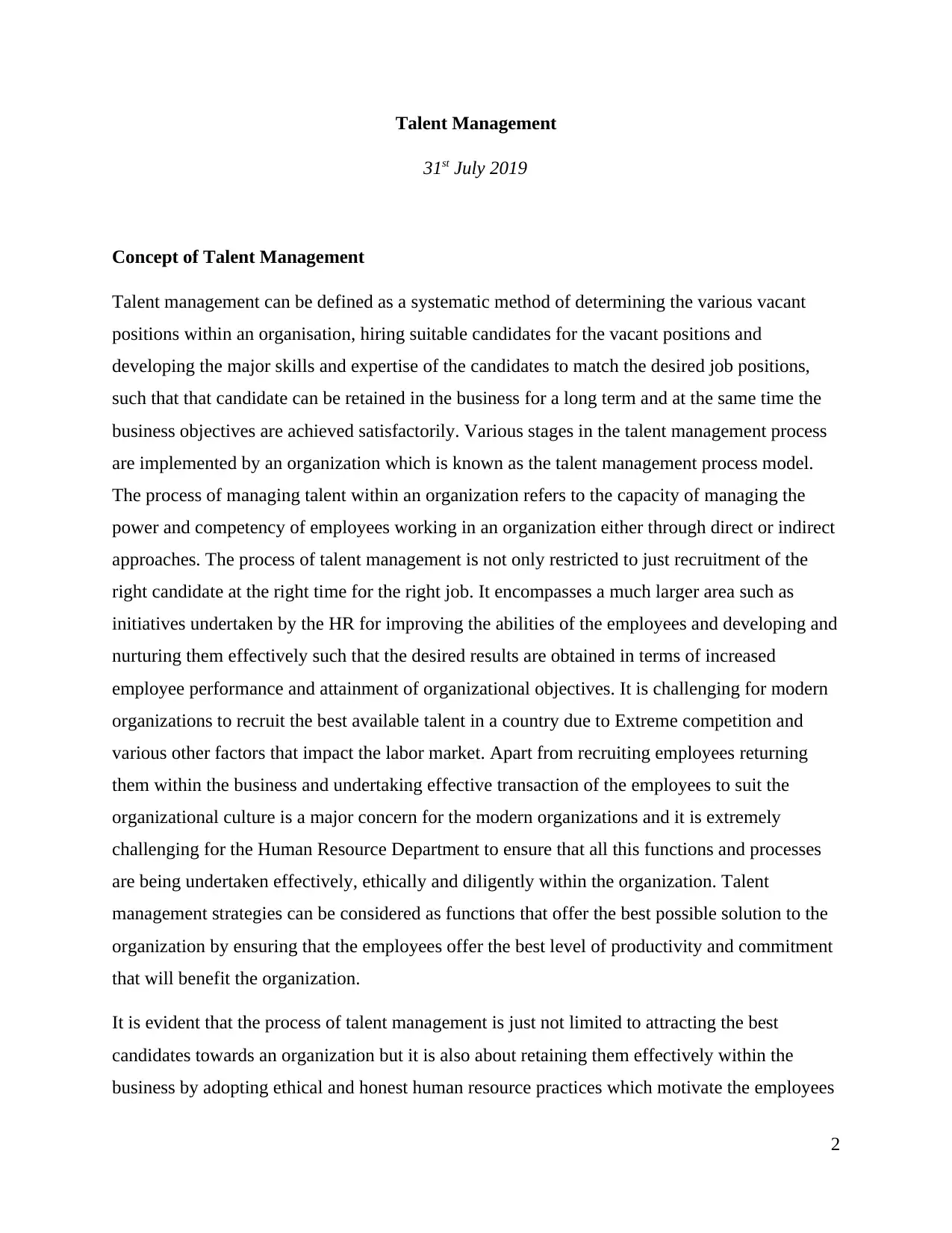
Talent Management
31st July 2019
Concept of Talent Management
Talent management can be defined as a systematic method of determining the various vacant
positions within an organisation, hiring suitable candidates for the vacant positions and
developing the major skills and expertise of the candidates to match the desired job positions,
such that that candidate can be retained in the business for a long term and at the same time the
business objectives are achieved satisfactorily. Various stages in the talent management process
are implemented by an organization which is known as the talent management process model.
The process of managing talent within an organization refers to the capacity of managing the
power and competency of employees working in an organization either through direct or indirect
approaches. The process of talent management is not only restricted to just recruitment of the
right candidate at the right time for the right job. It encompasses a much larger area such as
initiatives undertaken by the HR for improving the abilities of the employees and developing and
nurturing them effectively such that the desired results are obtained in terms of increased
employee performance and attainment of organizational objectives. It is challenging for modern
organizations to recruit the best available talent in a country due to Extreme competition and
various other factors that impact the labor market. Apart from recruiting employees returning
them within the business and undertaking effective transaction of the employees to suit the
organizational culture is a major concern for the modern organizations and it is extremely
challenging for the Human Resource Department to ensure that all this functions and processes
are being undertaken effectively, ethically and diligently within the organization. Talent
management strategies can be considered as functions that offer the best possible solution to the
organization by ensuring that the employees offer the best level of productivity and commitment
that will benefit the organization.
It is evident that the process of talent management is just not limited to attracting the best
candidates towards an organization but it is also about retaining them effectively within the
business by adopting ethical and honest human resource practices which motivate the employees
2
31st July 2019
Concept of Talent Management
Talent management can be defined as a systematic method of determining the various vacant
positions within an organisation, hiring suitable candidates for the vacant positions and
developing the major skills and expertise of the candidates to match the desired job positions,
such that that candidate can be retained in the business for a long term and at the same time the
business objectives are achieved satisfactorily. Various stages in the talent management process
are implemented by an organization which is known as the talent management process model.
The process of managing talent within an organization refers to the capacity of managing the
power and competency of employees working in an organization either through direct or indirect
approaches. The process of talent management is not only restricted to just recruitment of the
right candidate at the right time for the right job. It encompasses a much larger area such as
initiatives undertaken by the HR for improving the abilities of the employees and developing and
nurturing them effectively such that the desired results are obtained in terms of increased
employee performance and attainment of organizational objectives. It is challenging for modern
organizations to recruit the best available talent in a country due to Extreme competition and
various other factors that impact the labor market. Apart from recruiting employees returning
them within the business and undertaking effective transaction of the employees to suit the
organizational culture is a major concern for the modern organizations and it is extremely
challenging for the Human Resource Department to ensure that all this functions and processes
are being undertaken effectively, ethically and diligently within the organization. Talent
management strategies can be considered as functions that offer the best possible solution to the
organization by ensuring that the employees offer the best level of productivity and commitment
that will benefit the organization.
It is evident that the process of talent management is just not limited to attracting the best
candidates towards an organization but it is also about retaining them effectively within the
business by adopting ethical and honest human resource practices which motivate the employees
2

in several ways and ensure they are successful retention within the organization. The talent
management procedures implemented by an organization can be considered as a continuous
phenomenon that enables an organization to achieve the various human resource requirements
such as sourcing, recruiting, developing, retaining and promoting talent within the business. If a
business wants to ensure that it has the best possible talent pool as compared to its major rivals in
the industry then the management must offer something unique to the employees such that they
are attracted to joining the organization instead of the competing organizations. However, hiring
talent is not the key objective of recruiting the right candidate for the right job position. The
management must be aware of the strategies that need to be implemented to ensure that the
employee can offer the best possible performance and it can achieve individual as well as
organizational objectives. Hence the talent management process is an extremely essential human
resource function that manages and controls an employee write from recruitment till exiting the
organization. Many of the organizations are now using modern integrated software applications
for performing various talent management functions effectively and with the least possible
errors.
Talent Management Process Model
It consists of various stages such as follows:
Planning- this is the first stage of the talent management process where the objective is
to determine the requirement of the human capital within the business. Here, HR
develops the various job descriptions and formulates the key roles and responsibilities of
the candidates. At this stage, a workforce plan for recruitment is proposed by the HR
department of the organization.
Attracting- in the second stage, the source of recruitment is determined by the HR
department. Candidates can be attracted for the various vacant job positions from internal
or external sources by undertaking strategies. One of the sourcing channels are the job
portals which offer information about various candidates such as their skills, expertise,
and experience. Social networking sites can also be considered as important resources
from which candidates can be selected. One of the internal methods of attracting
candidates towards various vacant job positions is employee referral.
3
management procedures implemented by an organization can be considered as a continuous
phenomenon that enables an organization to achieve the various human resource requirements
such as sourcing, recruiting, developing, retaining and promoting talent within the business. If a
business wants to ensure that it has the best possible talent pool as compared to its major rivals in
the industry then the management must offer something unique to the employees such that they
are attracted to joining the organization instead of the competing organizations. However, hiring
talent is not the key objective of recruiting the right candidate for the right job position. The
management must be aware of the strategies that need to be implemented to ensure that the
employee can offer the best possible performance and it can achieve individual as well as
organizational objectives. Hence the talent management process is an extremely essential human
resource function that manages and controls an employee write from recruitment till exiting the
organization. Many of the organizations are now using modern integrated software applications
for performing various talent management functions effectively and with the least possible
errors.
Talent Management Process Model
It consists of various stages such as follows:
Planning- this is the first stage of the talent management process where the objective is
to determine the requirement of the human capital within the business. Here, HR
develops the various job descriptions and formulates the key roles and responsibilities of
the candidates. At this stage, a workforce plan for recruitment is proposed by the HR
department of the organization.
Attracting- in the second stage, the source of recruitment is determined by the HR
department. Candidates can be attracted for the various vacant job positions from internal
or external sources by undertaking strategies. One of the sourcing channels are the job
portals which offer information about various candidates such as their skills, expertise,
and experience. Social networking sites can also be considered as important resources
from which candidates can be selected. One of the internal methods of attracting
candidates towards various vacant job positions is employee referral.
3
⊘ This is a preview!⊘
Do you want full access?
Subscribe today to unlock all pages.

Trusted by 1+ million students worldwide

Selecting- recruitment and selection of candidates is a major strategy of the HR
department of an organization that needs to be conducted effectively. Several stages in
the selection process can be undertaken by a business organization. Written tests and
interviews can be conducted for selection. Then a scrutinization process will be
undertaken by the teacher for selecting the most desirable candidates for the various job
profiles.
Developing- at this stage, the candidate who is selected for a particular job position is
developed and prepared to meet the organizational criteria and needs of the job profile. It
consists of first undertaking an onboarding or an orientation program. It is followed by
developing the skills, proficiency, and aptitude of the candidate who has been selected to
match the job profile. Thereafter, mentoring, counseling and coaching sessions are
provided to the incumbent to make them suitable for the organization.
Retaining- retaining the selected employees within the organization is of utmost
importance for the long term sustainability of the organization. There are various
methods in which the human resource can achieve effective employee retention such as
increments and promotions, undertaking participative decision making, offering growth
and career development opportunities to the employees, offering effective training and
development of the employees and recognizing individual contribution and performances
of the employees and rewarding them accordingly.
Transitioning- one of the most important objectives of talent management within an
organization is to achieve a holistic transformation of the employees such that the
organizational vision and objectives are attained effectively. This phase is materialized by
undertaking several strategies such as offering retirement benefits to the employees,
undertaking exit interviews and developing succession planning and internal promotions
ethically and prudently.
Talent Management Initiatives
The managers have a major role to play to ensure that there is effective personal development of
the candidates that have been selected for various job positions within the organization. There
needs to be the development of a long term association of the organization with its employees.
4
department of an organization that needs to be conducted effectively. Several stages in
the selection process can be undertaken by a business organization. Written tests and
interviews can be conducted for selection. Then a scrutinization process will be
undertaken by the teacher for selecting the most desirable candidates for the various job
profiles.
Developing- at this stage, the candidate who is selected for a particular job position is
developed and prepared to meet the organizational criteria and needs of the job profile. It
consists of first undertaking an onboarding or an orientation program. It is followed by
developing the skills, proficiency, and aptitude of the candidate who has been selected to
match the job profile. Thereafter, mentoring, counseling and coaching sessions are
provided to the incumbent to make them suitable for the organization.
Retaining- retaining the selected employees within the organization is of utmost
importance for the long term sustainability of the organization. There are various
methods in which the human resource can achieve effective employee retention such as
increments and promotions, undertaking participative decision making, offering growth
and career development opportunities to the employees, offering effective training and
development of the employees and recognizing individual contribution and performances
of the employees and rewarding them accordingly.
Transitioning- one of the most important objectives of talent management within an
organization is to achieve a holistic transformation of the employees such that the
organizational vision and objectives are attained effectively. This phase is materialized by
undertaking several strategies such as offering retirement benefits to the employees,
undertaking exit interviews and developing succession planning and internal promotions
ethically and prudently.
Talent Management Initiatives
The managers have a major role to play to ensure that there is effective personal development of
the candidates that have been selected for various job positions within the organization. There
needs to be the development of a long term association of the organization with its employees.
4
Paraphrase This Document
Need a fresh take? Get an instant paraphrase of this document with our AI Paraphraser
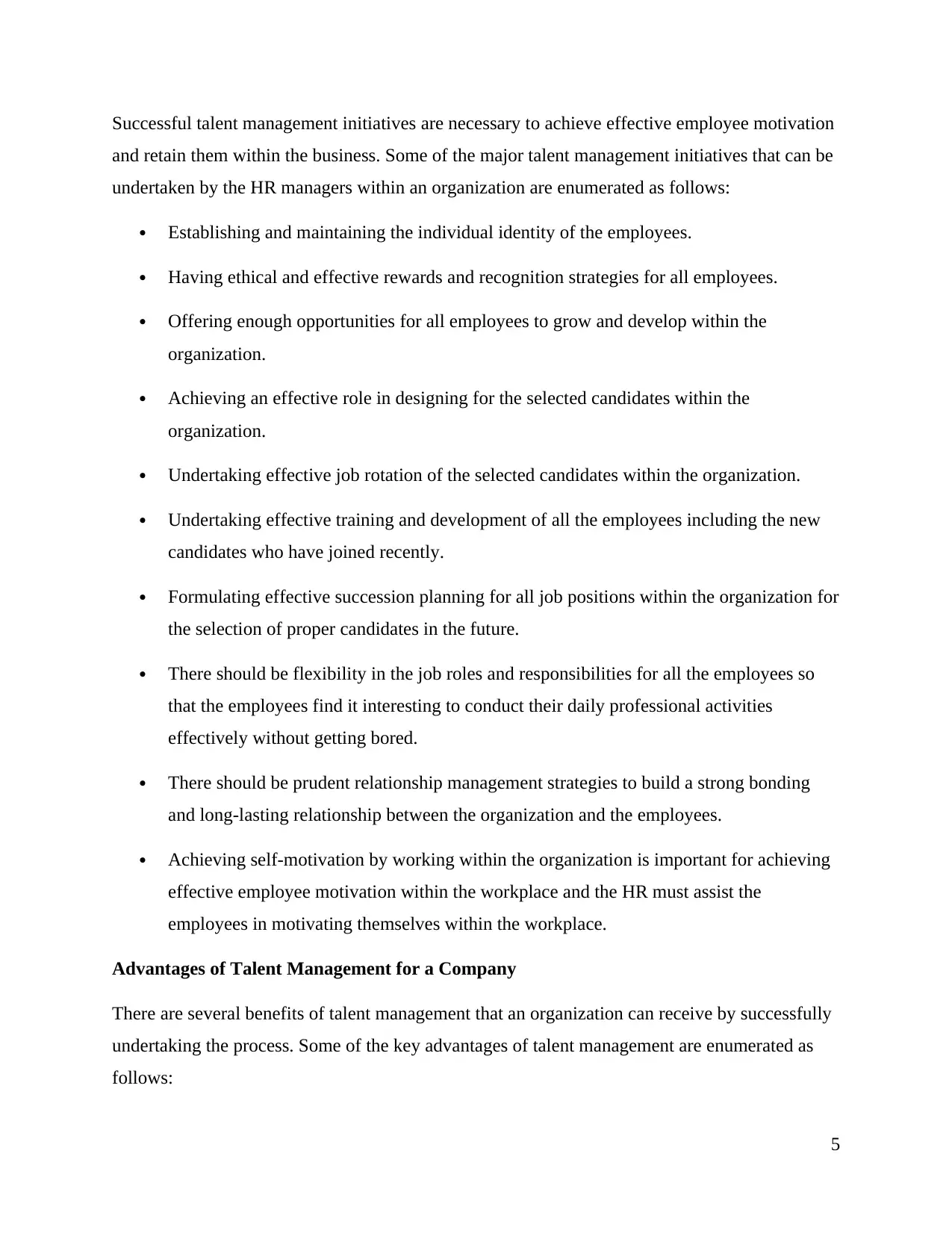
Successful talent management initiatives are necessary to achieve effective employee motivation
and retain them within the business. Some of the major talent management initiatives that can be
undertaken by the HR managers within an organization are enumerated as follows:
Establishing and maintaining the individual identity of the employees.
Having ethical and effective rewards and recognition strategies for all employees.
Offering enough opportunities for all employees to grow and develop within the
organization.
Achieving an effective role in designing for the selected candidates within the
organization.
Undertaking effective job rotation of the selected candidates within the organization.
Undertaking effective training and development of all the employees including the new
candidates who have joined recently.
Formulating effective succession planning for all job positions within the organization for
the selection of proper candidates in the future.
There should be flexibility in the job roles and responsibilities for all the employees so
that the employees find it interesting to conduct their daily professional activities
effectively without getting bored.
There should be prudent relationship management strategies to build a strong bonding
and long-lasting relationship between the organization and the employees.
Achieving self-motivation by working within the organization is important for achieving
effective employee motivation within the workplace and the HR must assist the
employees in motivating themselves within the workplace.
Advantages of Talent Management for a Company
There are several benefits of talent management that an organization can receive by successfully
undertaking the process. Some of the key advantages of talent management are enumerated as
follows:
5
and retain them within the business. Some of the major talent management initiatives that can be
undertaken by the HR managers within an organization are enumerated as follows:
Establishing and maintaining the individual identity of the employees.
Having ethical and effective rewards and recognition strategies for all employees.
Offering enough opportunities for all employees to grow and develop within the
organization.
Achieving an effective role in designing for the selected candidates within the
organization.
Undertaking effective job rotation of the selected candidates within the organization.
Undertaking effective training and development of all the employees including the new
candidates who have joined recently.
Formulating effective succession planning for all job positions within the organization for
the selection of proper candidates in the future.
There should be flexibility in the job roles and responsibilities for all the employees so
that the employees find it interesting to conduct their daily professional activities
effectively without getting bored.
There should be prudent relationship management strategies to build a strong bonding
and long-lasting relationship between the organization and the employees.
Achieving self-motivation by working within the organization is important for achieving
effective employee motivation within the workplace and the HR must assist the
employees in motivating themselves within the workplace.
Advantages of Talent Management for a Company
There are several benefits of talent management that an organization can receive by successfully
undertaking the process. Some of the key advantages of talent management are enumerated as
follows:
5
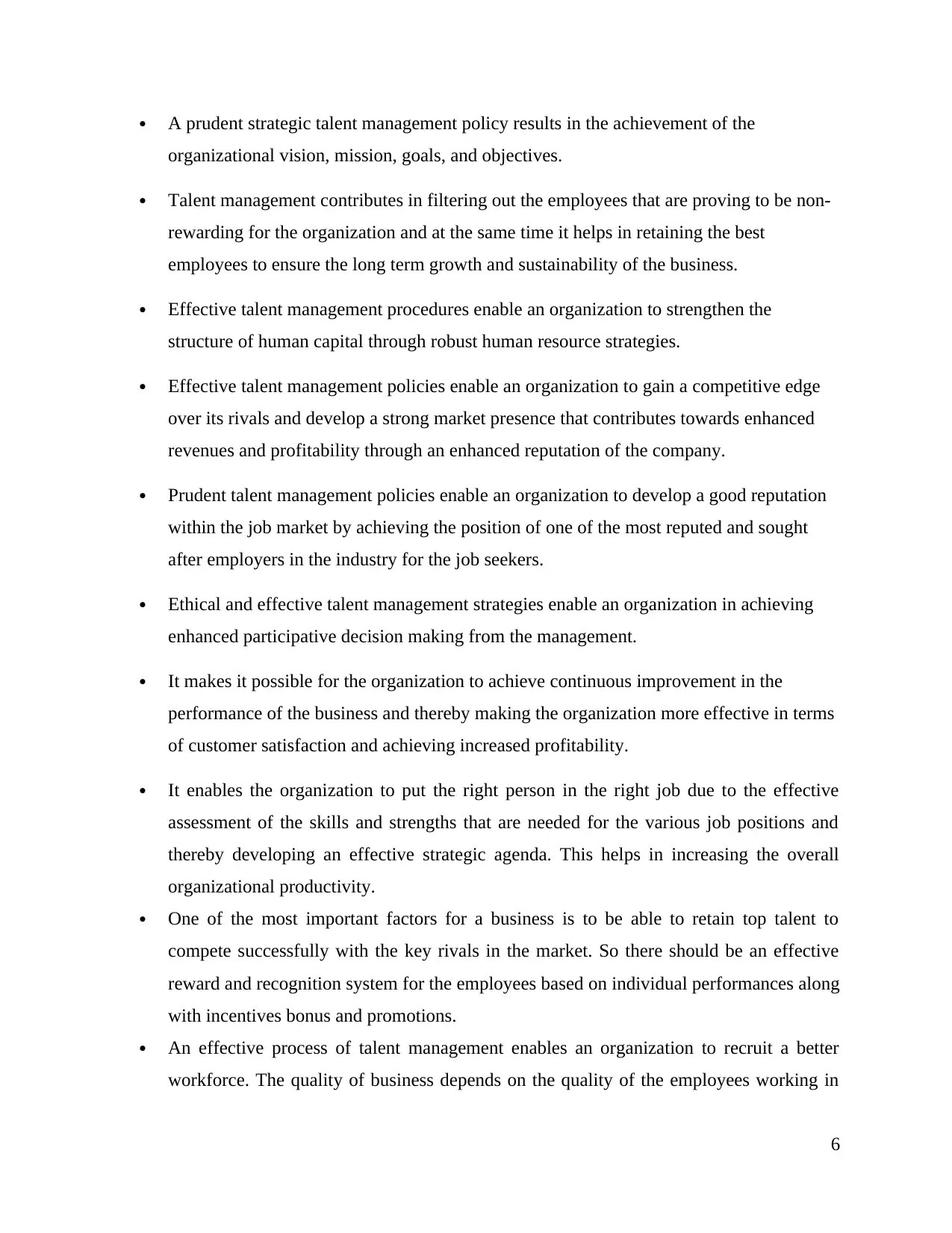
A prudent strategic talent management policy results in the achievement of the
organizational vision, mission, goals, and objectives.
Talent management contributes in filtering out the employees that are proving to be non-
rewarding for the organization and at the same time it helps in retaining the best
employees to ensure the long term growth and sustainability of the business.
Effective talent management procedures enable an organization to strengthen the
structure of human capital through robust human resource strategies.
Effective talent management policies enable an organization to gain a competitive edge
over its rivals and develop a strong market presence that contributes towards enhanced
revenues and profitability through an enhanced reputation of the company.
Prudent talent management policies enable an organization to develop a good reputation
within the job market by achieving the position of one of the most reputed and sought
after employers in the industry for the job seekers.
Ethical and effective talent management strategies enable an organization in achieving
enhanced participative decision making from the management.
It makes it possible for the organization to achieve continuous improvement in the
performance of the business and thereby making the organization more effective in terms
of customer satisfaction and achieving increased profitability.
It enables the organization to put the right person in the right job due to the effective
assessment of the skills and strengths that are needed for the various job positions and
thereby developing an effective strategic agenda. This helps in increasing the overall
organizational productivity.
One of the most important factors for a business is to be able to retain top talent to
compete successfully with the key rivals in the market. So there should be an effective
reward and recognition system for the employees based on individual performances along
with incentives bonus and promotions.
An effective process of talent management enables an organization to recruit a better
workforce. The quality of business depends on the quality of the employees working in
6
organizational vision, mission, goals, and objectives.
Talent management contributes in filtering out the employees that are proving to be non-
rewarding for the organization and at the same time it helps in retaining the best
employees to ensure the long term growth and sustainability of the business.
Effective talent management procedures enable an organization to strengthen the
structure of human capital through robust human resource strategies.
Effective talent management policies enable an organization to gain a competitive edge
over its rivals and develop a strong market presence that contributes towards enhanced
revenues and profitability through an enhanced reputation of the company.
Prudent talent management policies enable an organization to develop a good reputation
within the job market by achieving the position of one of the most reputed and sought
after employers in the industry for the job seekers.
Ethical and effective talent management strategies enable an organization in achieving
enhanced participative decision making from the management.
It makes it possible for the organization to achieve continuous improvement in the
performance of the business and thereby making the organization more effective in terms
of customer satisfaction and achieving increased profitability.
It enables the organization to put the right person in the right job due to the effective
assessment of the skills and strengths that are needed for the various job positions and
thereby developing an effective strategic agenda. This helps in increasing the overall
organizational productivity.
One of the most important factors for a business is to be able to retain top talent to
compete successfully with the key rivals in the market. So there should be an effective
reward and recognition system for the employees based on individual performances along
with incentives bonus and promotions.
An effective process of talent management enables an organization to recruit a better
workforce. The quality of business depends on the quality of the employees working in
6
⊘ This is a preview!⊘
Do you want full access?
Subscribe today to unlock all pages.

Trusted by 1+ million students worldwide
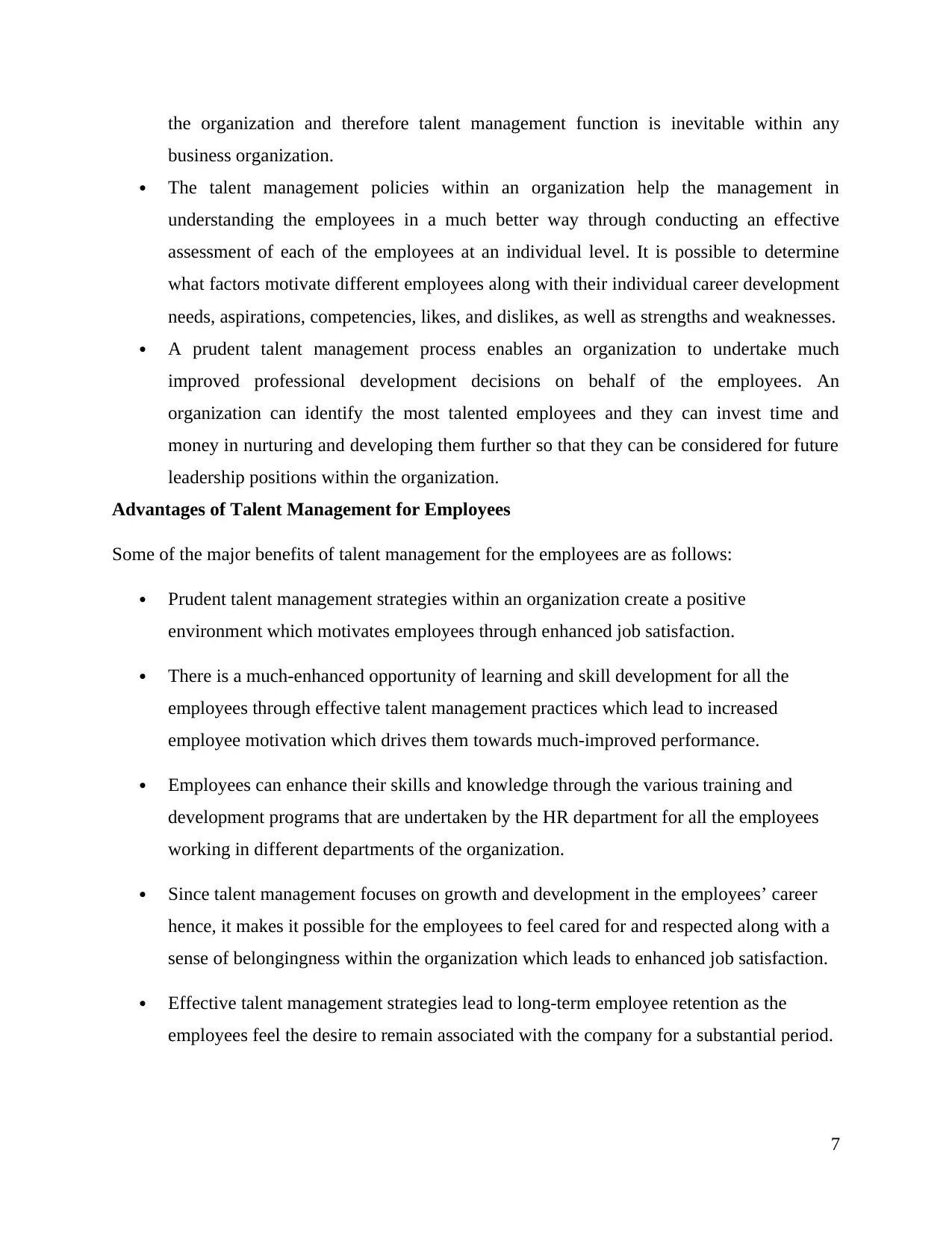
the organization and therefore talent management function is inevitable within any
business organization.
The talent management policies within an organization help the management in
understanding the employees in a much better way through conducting an effective
assessment of each of the employees at an individual level. It is possible to determine
what factors motivate different employees along with their individual career development
needs, aspirations, competencies, likes, and dislikes, as well as strengths and weaknesses.
A prudent talent management process enables an organization to undertake much
improved professional development decisions on behalf of the employees. An
organization can identify the most talented employees and they can invest time and
money in nurturing and developing them further so that they can be considered for future
leadership positions within the organization.
Advantages of Talent Management for Employees
Some of the major benefits of talent management for the employees are as follows:
Prudent talent management strategies within an organization create a positive
environment which motivates employees through enhanced job satisfaction.
There is a much-enhanced opportunity of learning and skill development for all the
employees through effective talent management practices which lead to increased
employee motivation which drives them towards much-improved performance.
Employees can enhance their skills and knowledge through the various training and
development programs that are undertaken by the HR department for all the employees
working in different departments of the organization.
Since talent management focuses on growth and development in the employees’ career
hence, it makes it possible for the employees to feel cared for and respected along with a
sense of belongingness within the organization which leads to enhanced job satisfaction.
Effective talent management strategies lead to long-term employee retention as the
employees feel the desire to remain associated with the company for a substantial period.
7
business organization.
The talent management policies within an organization help the management in
understanding the employees in a much better way through conducting an effective
assessment of each of the employees at an individual level. It is possible to determine
what factors motivate different employees along with their individual career development
needs, aspirations, competencies, likes, and dislikes, as well as strengths and weaknesses.
A prudent talent management process enables an organization to undertake much
improved professional development decisions on behalf of the employees. An
organization can identify the most talented employees and they can invest time and
money in nurturing and developing them further so that they can be considered for future
leadership positions within the organization.
Advantages of Talent Management for Employees
Some of the major benefits of talent management for the employees are as follows:
Prudent talent management strategies within an organization create a positive
environment which motivates employees through enhanced job satisfaction.
There is a much-enhanced opportunity of learning and skill development for all the
employees through effective talent management practices which lead to increased
employee motivation which drives them towards much-improved performance.
Employees can enhance their skills and knowledge through the various training and
development programs that are undertaken by the HR department for all the employees
working in different departments of the organization.
Since talent management focuses on growth and development in the employees’ career
hence, it makes it possible for the employees to feel cared for and respected along with a
sense of belongingness within the organization which leads to enhanced job satisfaction.
Effective talent management strategies lead to long-term employee retention as the
employees feel the desire to remain associated with the company for a substantial period.
7
Paraphrase This Document
Need a fresh take? Get an instant paraphrase of this document with our AI Paraphraser
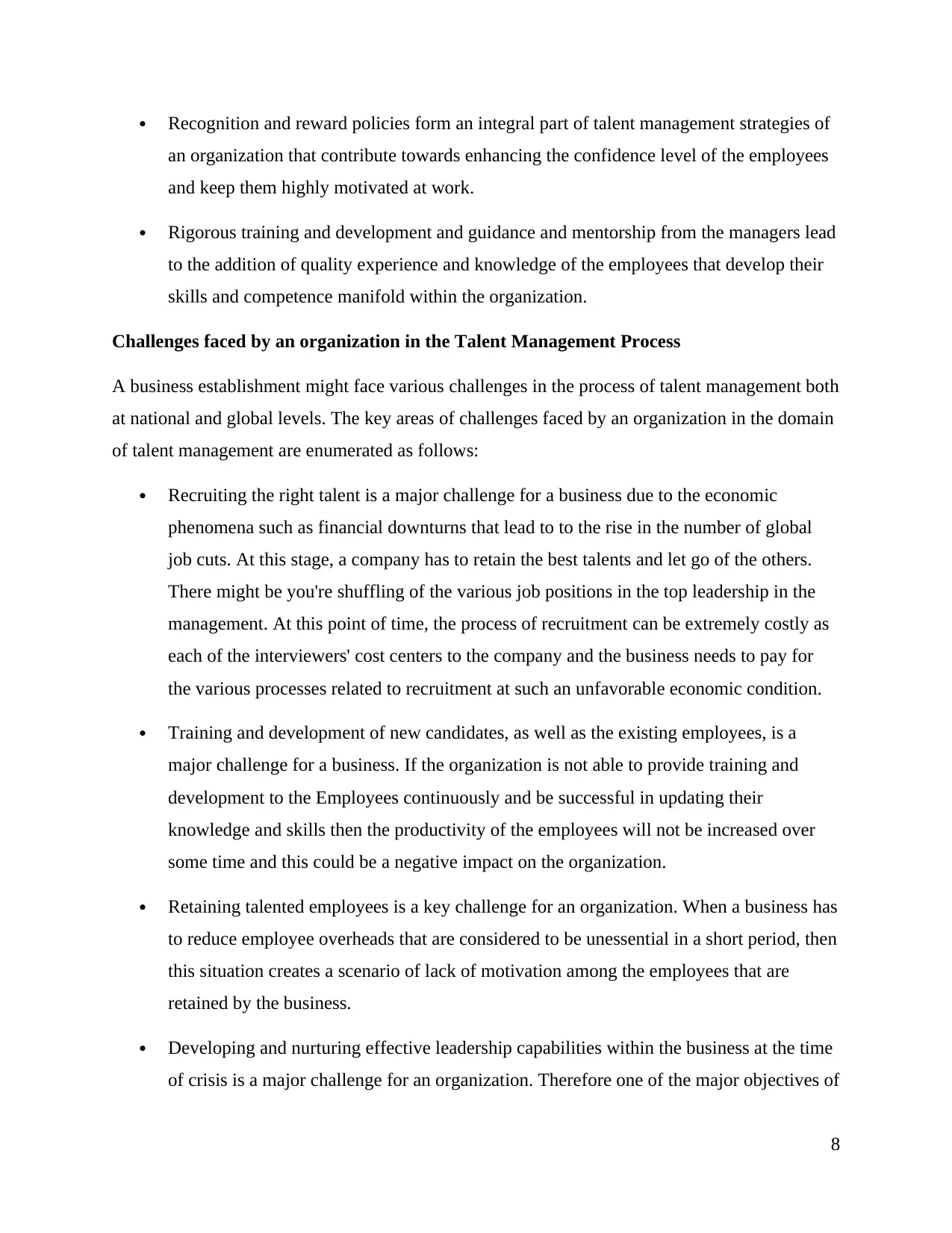
Recognition and reward policies form an integral part of talent management strategies of
an organization that contribute towards enhancing the confidence level of the employees
and keep them highly motivated at work.
Rigorous training and development and guidance and mentorship from the managers lead
to the addition of quality experience and knowledge of the employees that develop their
skills and competence manifold within the organization.
Challenges faced by an organization in the Talent Management Process
A business establishment might face various challenges in the process of talent management both
at national and global levels. The key areas of challenges faced by an organization in the domain
of talent management are enumerated as follows:
Recruiting the right talent is a major challenge for a business due to the economic
phenomena such as financial downturns that lead to to the rise in the number of global
job cuts. At this stage, a company has to retain the best talents and let go of the others.
There might be you're shuffling of the various job positions in the top leadership in the
management. At this point of time, the process of recruitment can be extremely costly as
each of the interviewers' cost centers to the company and the business needs to pay for
the various processes related to recruitment at such an unfavorable economic condition.
Training and development of new candidates, as well as the existing employees, is a
major challenge for a business. If the organization is not able to provide training and
development to the Employees continuously and be successful in updating their
knowledge and skills then the productivity of the employees will not be increased over
some time and this could be a negative impact on the organization.
Retaining talented employees is a key challenge for an organization. When a business has
to reduce employee overheads that are considered to be unessential in a short period, then
this situation creates a scenario of lack of motivation among the employees that are
retained by the business.
Developing and nurturing effective leadership capabilities within the business at the time
of crisis is a major challenge for an organization. Therefore one of the major objectives of
8
an organization that contribute towards enhancing the confidence level of the employees
and keep them highly motivated at work.
Rigorous training and development and guidance and mentorship from the managers lead
to the addition of quality experience and knowledge of the employees that develop their
skills and competence manifold within the organization.
Challenges faced by an organization in the Talent Management Process
A business establishment might face various challenges in the process of talent management both
at national and global levels. The key areas of challenges faced by an organization in the domain
of talent management are enumerated as follows:
Recruiting the right talent is a major challenge for a business due to the economic
phenomena such as financial downturns that lead to to the rise in the number of global
job cuts. At this stage, a company has to retain the best talents and let go of the others.
There might be you're shuffling of the various job positions in the top leadership in the
management. At this point of time, the process of recruitment can be extremely costly as
each of the interviewers' cost centers to the company and the business needs to pay for
the various processes related to recruitment at such an unfavorable economic condition.
Training and development of new candidates, as well as the existing employees, is a
major challenge for a business. If the organization is not able to provide training and
development to the Employees continuously and be successful in updating their
knowledge and skills then the productivity of the employees will not be increased over
some time and this could be a negative impact on the organization.
Retaining talented employees is a key challenge for an organization. When a business has
to reduce employee overheads that are considered to be unessential in a short period, then
this situation creates a scenario of lack of motivation among the employees that are
retained by the business.
Developing and nurturing effective leadership capabilities within the business at the time
of crisis is a major challenge for an organization. Therefore one of the major objectives of
8
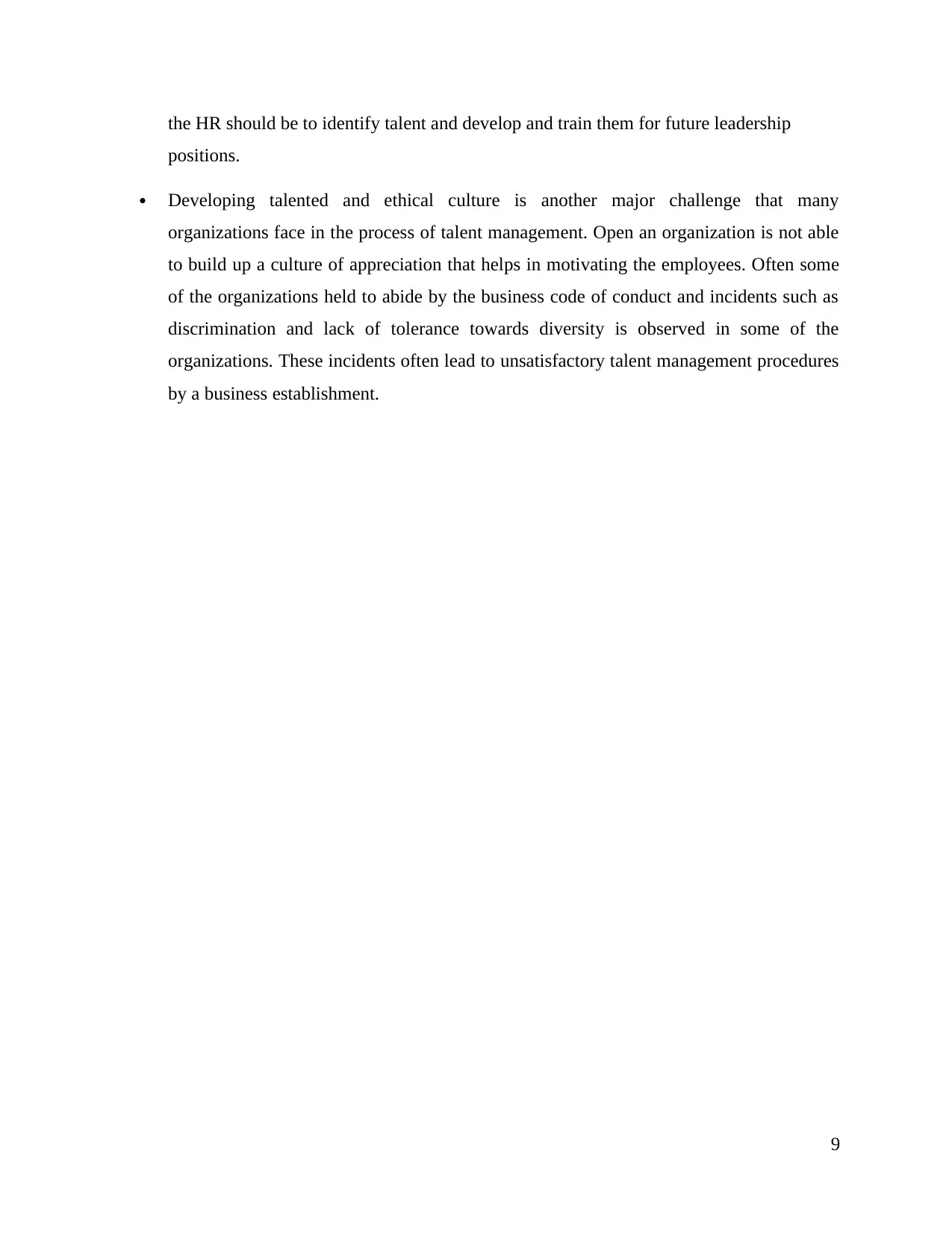
the HR should be to identify talent and develop and train them for future leadership
positions.
Developing talented and ethical culture is another major challenge that many
organizations face in the process of talent management. Open an organization is not able
to build up a culture of appreciation that helps in motivating the employees. Often some
of the organizations held to abide by the business code of conduct and incidents such as
discrimination and lack of tolerance towards diversity is observed in some of the
organizations. These incidents often lead to unsatisfactory talent management procedures
by a business establishment.
9
positions.
Developing talented and ethical culture is another major challenge that many
organizations face in the process of talent management. Open an organization is not able
to build up a culture of appreciation that helps in motivating the employees. Often some
of the organizations held to abide by the business code of conduct and incidents such as
discrimination and lack of tolerance towards diversity is observed in some of the
organizations. These incidents often lead to unsatisfactory talent management procedures
by a business establishment.
9
⊘ This is a preview!⊘
Do you want full access?
Subscribe today to unlock all pages.

Trusted by 1+ million students worldwide
1 out of 9
Related Documents
Your All-in-One AI-Powered Toolkit for Academic Success.
+13062052269
info@desklib.com
Available 24*7 on WhatsApp / Email
![[object Object]](/_next/static/media/star-bottom.7253800d.svg)
Unlock your academic potential
Copyright © 2020–2026 A2Z Services. All Rights Reserved. Developed and managed by ZUCOL.





